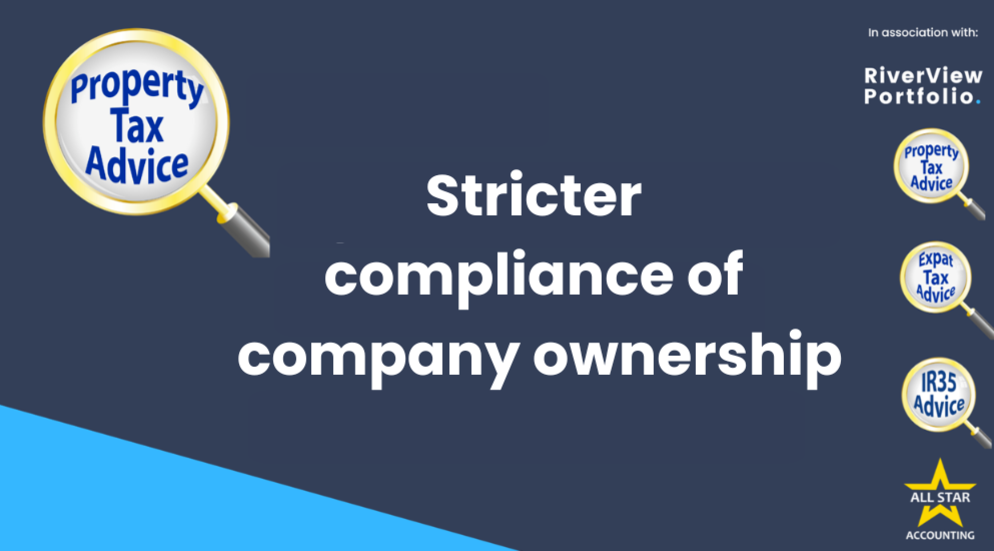Stricter compliance of company ownership
Posted on 22nd December 2023 at 09:09
When Companies House launched the People with Significant Control (PSC) register in 2016, it was, the government said, part of the efforts of the UK government to combat economic crime, while ensuring legitimate businesses continue to see the UK as a great place to invest.
There’s been a fairly constant evolution of these regulations through the AML (Anti-Money Laundering) regulations of the likes of the Financial Action Task Force as well as at Companies House itself.
A recent piece of regulation was The Register of Overseas Entities, which is administered by Companies House, and came into force in the UK on 1 August 2022 and requires anonymous foreign owners of UK property to reveal their real identities, setting a global standard for transparency.
Overseas entities (speak with us to check if that definition applies to you) who want to buy, sell, or transfer property or land in the UK, must register with Companies House and declare who their registrable beneficial owners or managing officers are.
This also applies retrospectively to overseas entities who bought property or land on or after:
1 January 1999 in England and Wales
8 December 2014 in Scotland
These overseas entities had to register with Companies House and declare who their registrable beneficial owners or managing officers are by 31 January 2023.
Overseas entities only need to register property or land bought in Northern Ireland on or after 1 August 2022.
The Register of Overseas Entities’ information is currently only be accessed by law enforcement and other relevant public agencies, but that will be changing; we’ll explain this shortly.
This is the first register in the world to shed light on overseas property ownership, and since it was launched, it now has more than 30,000 registrations. As with all new regulation, this comes with some significant implications for failure to comply.
The first financial penalties were issued in July 23 and Companies House continues to be vigilant in enforcing compliance, and as well as financial penalties, overseas entities which fail to register will find it difficult to sell, lease or raise charges over their land.
And the world is getting smaller…
Companies House is continuing to work with overseas company registries and UK land registries to identify entities which have failed to comply with the rules, is also working closely with law enforcement partners to aid their investigations and, where possible, provide crucial intelligence.
It was also announced that on 1 January 2024 the US Treasury will launch a Federal Beneficial Ownership Register, and Companies House has been supporting their US colleagues by sharing their experience and insight of setting up the PSC register.
So whilst it’s reassuring that the information provided to the register is currently only available to UK public servants and law enforcement, this evolution of the control of companies will continue because The Economic Crime and Corporate Transparency Act 2023 already provides a power for the Secretary of State to make regulations granting access to data on application in circumstances to be detailed in regulations … we can anticipate already that cross-border sharing of information will be coming and with the announcement that the US is moving down the same track as the UK, I think we assume where information will be shared soon.
The Director of Intelligence and Law Enforcement Liaison at Companies House, Martin Swain, said:
“Reaching 30,000 registrations is a significant milestone but also a positive sign that the register is achieving its objective of enhancing transparency of ownership of land and property in the UK by foreign entities.
Our focus remains on continuing to improve the register and rigorously enforcing compliance, so this transparency is maintained and enhanced yet further.
We will continue to scrutinise information on the register and will be vigilant in targeting individuals who attempt to avoid transparency. We will also ensure that we are proactively supporting our law enforcement colleagues to disrupt the use of UK property to hide illicit wealth.”
And there was of course support from the government for the success achieved by Companies House and law enforcement, where the Minister for Enterprise, Markets and Small Business Kevin Hollinrake said:
“The Register for Overseas Entities is imperative in ensuring we weed out kleptocrats and oligarchs buying up British properties under false names and has already helped identify absent landlords so that they can be held to account.
There is no place for fraud and other illegal activities in our society, so it is fantastic to see we’ve now had 30,000 registrations on the register, helping us to protect our citizens, business owners and bring criminals operating in the UK to justice.”
At our twin firms of Property Tax Advice, working with the colleagues at Expat Tax Advice, we have been advising on these issues since the initial consultation was published and helping our overseas clients achieve compliance.
If this post raises any issues or concerns for you, then please feel free to contact us at mark@expat-tax-advice.co.uk
Tagged as: Assets
Share this post:







